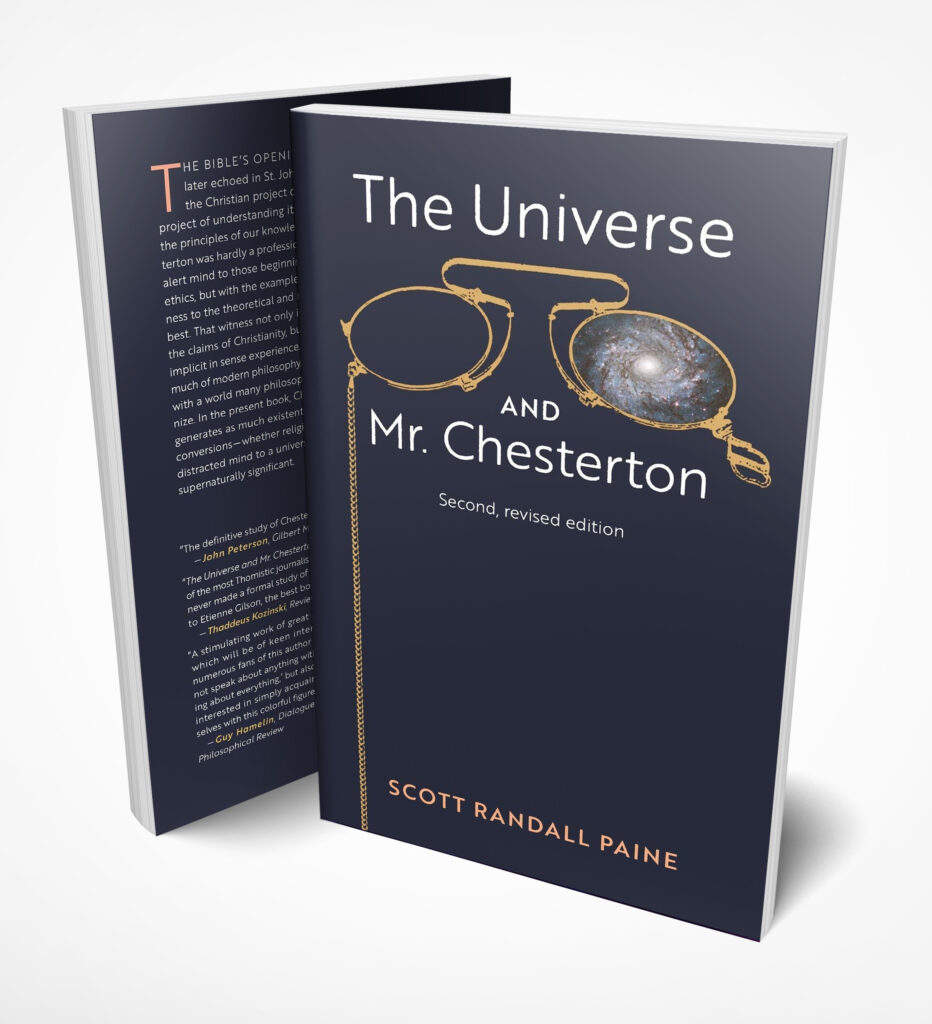The Universe and Mr. Chesterton
The Bible’s opening words “In the beginning” – later echoed in St. John’s Gospel – suggest an affinity between the Christian project of saving the world and the philosophical project of understanding it. Philosophy too ponders the beginnings, the principles of our knowledge and our universe. Although G.K. Chesterton was hardly a professional philosopher, he did turn a particularly alert mind to those beginnings – not with treatises on metaphysics or ethics, but with the example of a life of writing that gave eloquent witness to the theoretical and moral principles of Western thought at its best. That witness not only invites us to take a more objective look at the claims of Christianity, but also to welcome the lessons of wisdom implicit in sense experience. If this stance put Chesterton at odds with much of modern philosophy, it was only because it put him face to face with a world many philosophers could no longer see, but only scrutinize. In the present book, Chesterton’s way of looking at the universe ends up generating as much existential impact as a religious conversion. And conversions – whether religious or philosophical – typically redirect our easily distracted mind to a universe that is naturally evident only by being supernaturally significant.
The definitive study of Chesterton, the philosopher.”
Gilbert Magazine
The Universe and Mr. Chesterton is an excellent introduction to the thought of the most Thomistic journalist who ever wrote. Paine shows why a man who never made a formal study of the Doctor Angelicus could write, according to Etienne Gilson, the best book ever written about him.”
Review of Metaphysics
A stimulating work of great eloquence which will be of keen interest to the numerous fans of this author who ‘could not speak about anything without speaking about everything,’ but also to anyone interested in simply acquainting themselves with this colorful figure.”
Canadian Philosophical Review
REVIEWS
SECOND EDITION
Gilbert Magazine (2020): The Great Appreciator
FIRST EDITION
The Review of Metaphysics (1999): Universe and Mr. Chesterton
FIRST EDITION
Dialogue: Canadian Journal of Philosophy (2002): Universe and Mr. Chesterton
FIRST EDITION
American Chesterton Society, (1999): A Landmark Chesterton Study
FIRST EDITION
The Free Library (2001): Universe and Mr. Chesterton
FIRST EDITION
VII: Journal of the Marion E. Wade Center (2001): Universe and Mr. Chesterton
My introduction to the Ignatius Press edition of Chesterton’s Autobiography:
“The Life and Theme of G. K. Chesterton”
* * *
Brazilian translation of The Universe and Mr. Chesterton:
O filósofo busca, antes de mais nada, um norteamento sobre sua situação no mundo a partir de princípios. Depois, ele se pergunta se existe algo ou alguém além do mundo, um Absoluto, um Deus. Para Tomás de Aquino, antes de falar de Deus, a atitude que assumimos para com o mundo físico ao nosso redor impõe-se soberanamente. Se você escolhe aceitar essa existência – evidente, refulgente, mas imprecisa-, sua mente abrir-se-á cada vez mais às riquezas do real. Mas você pode recusá-la. Essa escolha precede toda lógica, é principial e desprovida da exatidão de uma fórmula ou da discursividade de um argumento. Alguns dos maiores filósofos modernos, desconfiando dessa imprecisão, recusaram-se a começar com a evidência do mundo extramental e procuraram substituí-la por um novo princípio mais preciso, mas também mais subjetivo.
Pode parecer implausível que essa escolha tenha causado algumas das confusões e dos transtornos agora tão característicos do homem contemporâneo. Mas é a essa conclusão que o jornalista inglês G. K. Chesterton chegou depois de ter quase caído, ele mesmo, no buraco negro do “pensamento que pára todo pensamento.” No livro Ortodoxia, Chesterton defende a maneira pré-racional, mas não por isso irracional, da captação dos primeiros princípios filosóficos nos campos teórico e moral. Depois, ele adverte que a recusa dessa “primeira saudação do universo” é capaz de gerar uma abundância de anomalias lógicas e éticas na vida humana. Mas maior surpresa apresentada é a descoberta de que o cristianismo secunda essas constatações. O presente livro introduz esse autor pouco conhecido no Brasil e mostra que, além do humor e da espirituosidade pelos quais é bem conhecido na Inglaterra, Chesterton possuía tamanha penetração filosófica que levou Étienne Gilson a considerá-lo “um dos pensadores mais profundos que já existiram”.




